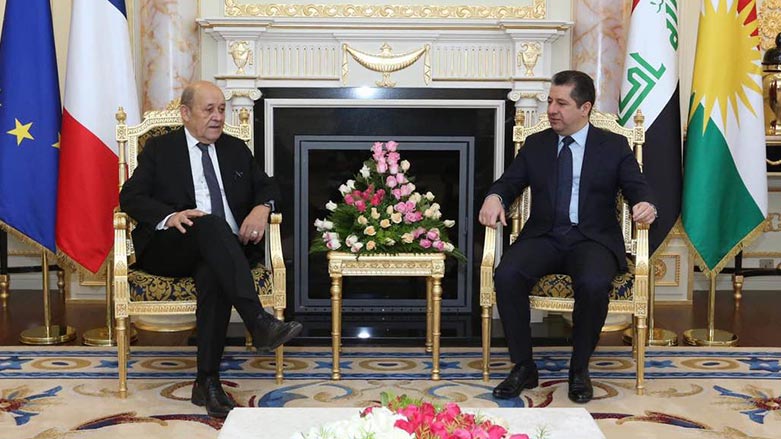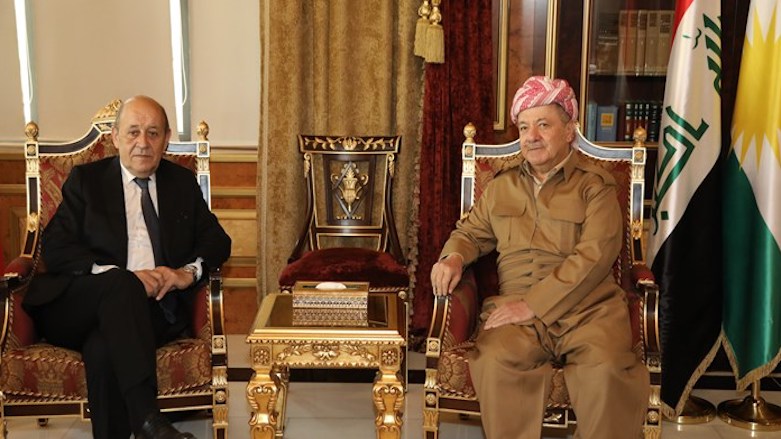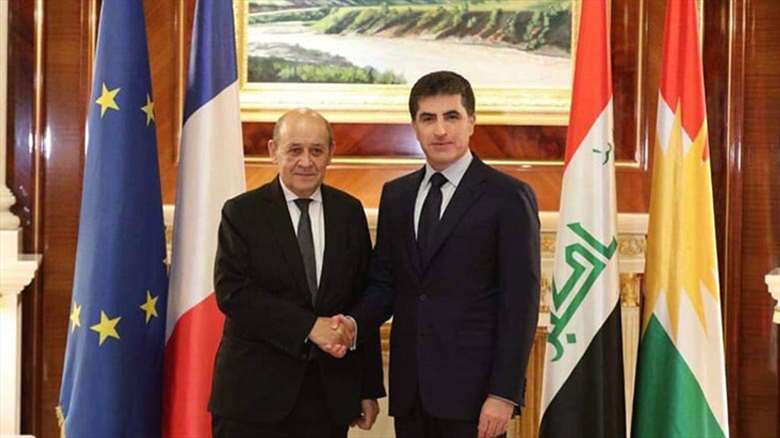KRG welcomes Syria ceasefire, rejects forced demographic change

ERBIL (Kurdistan 24) – Prime Minister of the Kurdistan Region Masrour Barzani on Friday welcomed the announcement of a ceasefire that purported to halt a Turkish-led incursion into northern Syria but rejected any moves by Turkey to forcibly change the demography of the area, a statement from the top official's office said.
The comments were made during a meeting in Erbil between Barzani and French Minister of Foreign Affairs Jean-Yves Le Drian, according to the statement.
The two officials expressed their concern about the current precarious situation in northern Syria, under attack by Turkey and Turkish-backed Islamist militias after an abrupt US withdrawal from the area paved the way for Ankara's long-threatened assault.
On Thursday, the Kurdish-led Syrian Democratic Forces (SDF) welcomed a US-brokered temporary ceasefire which President Donald Trump hailed as a great success and Ankara praised as "everything" it wanted.
Turkey, however, appears to be already violating the deal as their warplanes started pounding the same day a town where the ceasefire was to be in effect, targeting residential areas as well as hospitals.
Read More: Turkish airstrikes continue on Syria’s Serekaniye despite ceasefire
Abandoned by their longtime US allies in the fight against the Islamic State in Syria, the SDF sought a deal with American adversaries, the Syrian government of Bashar al-Assad and Russia, to bolster defenses against Turkey. Damascus has deployed national army troops to the north to confront the Turkish army and the militias it backs.
One of Ankara's stated goals in its military offensive, now in its second week, is to establish a so-called peace corridor—which is a sizable portion of the region the SDF control in Syria—to resettle Syrian refugees currently residing in Turkey. It also aims to confront Kurdish SDF fighters known as the People's Protection Units (YPG) whom Ankara considers terrorists.
Many displaced Syrians in Turkey—who fled Damascus' forceful crackdown on its citizens and the ensuing civil war from 2011 onwards—are not from the same areas of Syria that Ankara plans to settle. They also have different ethnic backgrounds from the local populations in northern Syria, sparking fears of intentional demographic change by resettling Syrians with different ethnicities there.
Turkey has already been accused of ethnic cleansing in the Kurdish town of Afrin, also near the Turkish border, since its forces and allied militias took over the city and nearby towns in March 2018. The region was previously controlled by the SDF and has since seen increased rates of violence and ethnic tension, amid claims of forced displacement and ethnically-motivated attacks on the local Kurdish-majority population. Many who left the area fearing for their lives have also had their property seized by the militias.
The current Turkish attack in northern Syria has also led to an exodus into stable areas outside of Syria. The Kurdistan Region has already welcomed close to 2,000 people, nine days since the Turkish assault began.
Read More: Iraqi Kurds plea for emergency funding amidst Syrian refugee influx
Barzani and Le Drian, according to Friday's statement, stressed the international community's key role and responsibility to assist the Kurdistan Region in sheltering refugees fleeing violence.
Le Drian arrived in the Kurdistan Region on Thursday following a visit to Baghdad, where he met with top Iraqi leaders to discuss, among other issues, a suitable mechanism to take foreign Islamic State militants imprisoned in Iraq to trial.
Prime Minister Barzani also briefed the French minister on the ongoing talks between the Kurdistan Regional Government (KRG) and the federal Iraqi government.
"We have repeatedly expressed our full readiness to reach an agreement with Baghdad. We have made a number of proposals for this. We hope the federal government will take more serious steps to resolve outstanding problems based on the constitution," said Barzani.
For his part, Le Drian said, "I have come to renew France's support for the people of the Kurdistan Region, which played a major role and made great sacrifices in the war against ISIS, and I saw with my own eyes the heroism and valor of the Peshmerga."
The foreign minister stressed the need to focus efforts to prevent the re-emergence of the so-called Islamic State, which remains a serious threat in several provinces of Iraq.
Editing by John J. Catherine


